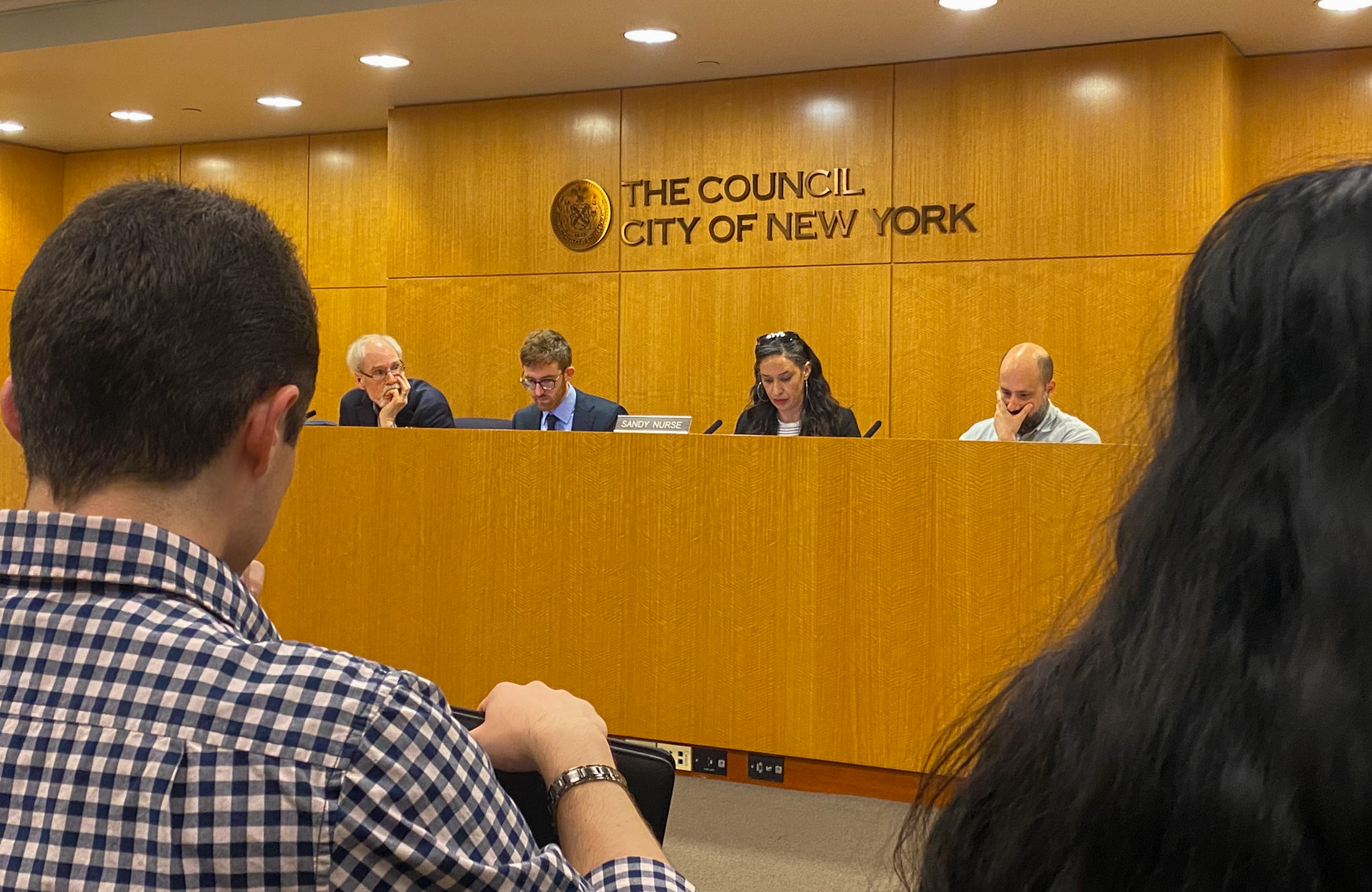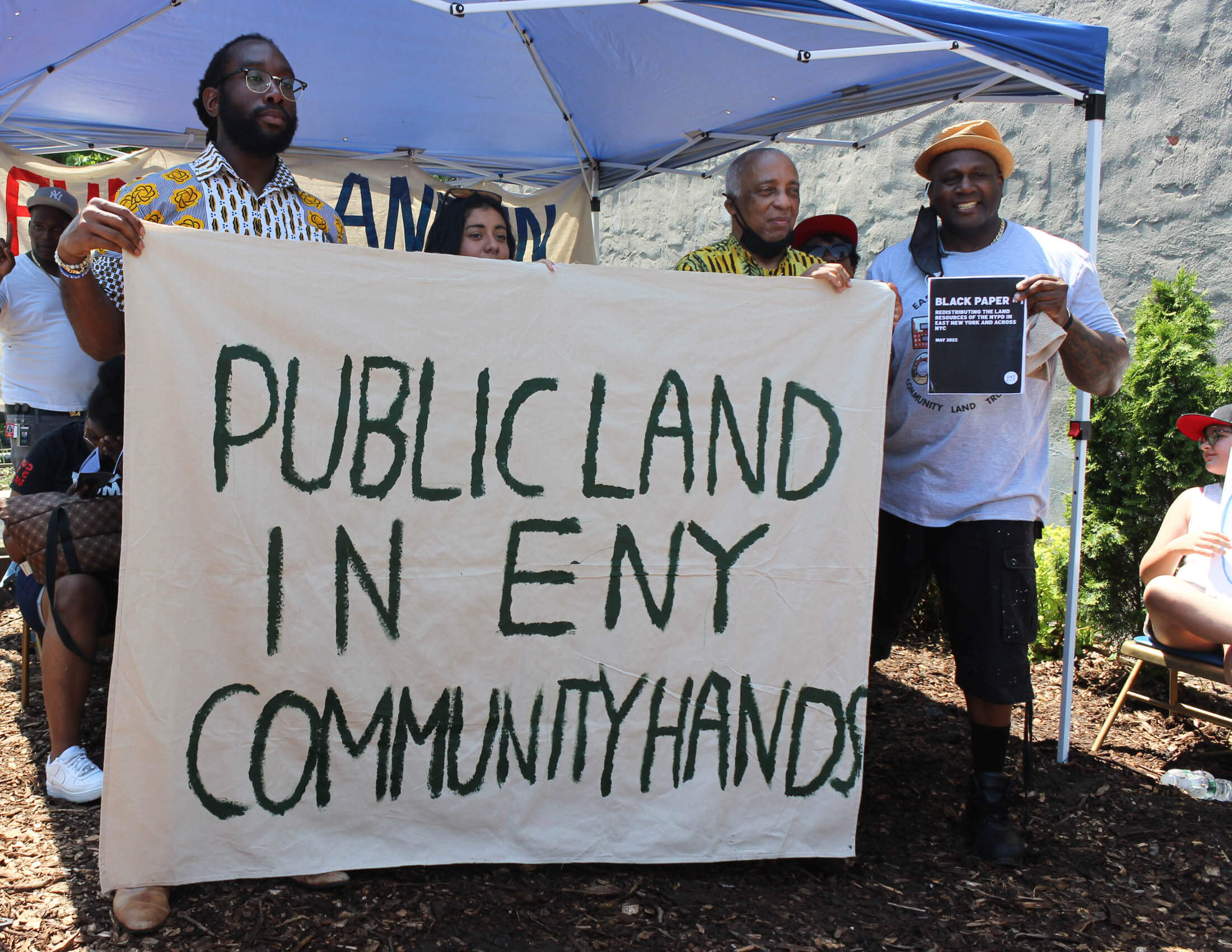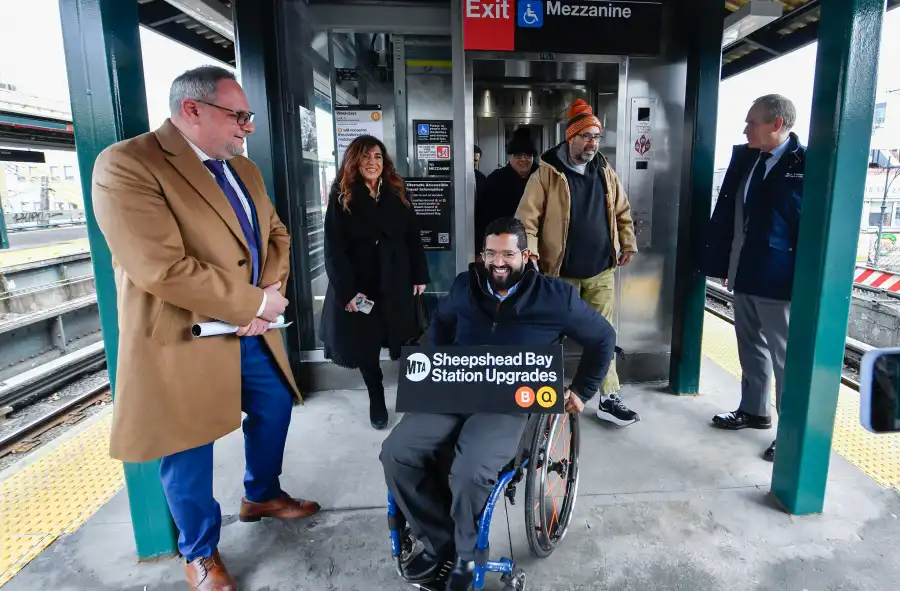Protest Briefly Halts Hearing on NYC’s Controversial Tax Lien Sale System
Activists, attorneys, and small landlords call for an end to the program they say fuels displacement and speculation.

Protesters at April’s Tax Lien Tax Force hearing. Photo by Anna Bradley-Smith
A public hearing on New York City’s controversial tax lien sale took a turn recently when protesters rushed the speaking area, chanting for task force members to “do your jobs, stop the sale that steals and robs,” unfurled a large banner, and stopped testimony before being told to leave by security.
The group behind the protest, the Abolish the New York City Tax Lien Sale Coalition, has long opposed the lien sale—a system through which the city sells property owners’ unpaid tax, water, and other city property debts to private investors, often leading to foreclosure.
Protesters staged the disruption at the April 30 hearing after testimony by Albert Scott, a lifelong East New York resident and founding member of the East New York Community Land Trust, who called on the city’s Tax Lien Sale Task Force to fulfill its legal mandate and explore alternatives to the current model. “Our Black, Latino, working class community of homeowners and tenants are being economically brutalized by this lien sale,” he said.
Scott and ENYCLT, a member of the Abolish the New York City Tax Lien Sale Coalition, say that despite the 2024 Local Law 82 requiring the task force to consider alternative systems for managing municipal debt, the group has failed to do so. Instead, they argue, it has focused on minor tweaks to a process they believe should be abolished.

A system under fire
The tax lien sale has been paused since 2021, but a new sale is taking place on Tuesday, June 3. The system allows the city to sell off unpaid city property debts to a trust backed by private investors. Such debts can include tax, water, sewer, the cost of property repairs handled by the city, and fines for building violations. Additional fees can balloon the amounts owed. That trust can then initiate foreclosure proceedings if debts go unpaid—something critics say disproportionately harms low- and middle-income New Yorkers, particularly in Black and brown neighborhoods.
Scott said East New York consistently ranks at the top of the lien sale list, and that corporate landlords in the area have used the system to skirt accountability while tenants live in unsafe conditions. In his testimony, he pointed to properties on Hendrix Street where landlords have been cited for mold, leaks, and pests, and one owes the city more than $220,000 in unpaid debts and has more than 120 violations on the property where his tenants live.
“There are so many stories like this across the entire city, yet, when it comes to properties like this, the city sells the liens and gives away its rights, its responsibilities, to hold bad landlords accountable and transfer them to responsible ownership.”
(In past decades, rather than passing to for-profit landlords, distressed buildings would become affordable housing such as rentals run by nonprofits and tenant-owned limited-equity HDFC co-ops.)
The Tax Lien Sale Task Force was originally established by Local Law 13 in 2019 and reauthorized in 2024 under Local Law 82. Its mandate includes exploring new systems for collecting delinquent property-related debt.

At the hearing, Council Member Sandy Nurse, co-chair of the task force and a representative of East New York, outlined preliminary reforms that have been enacted, including expanding access to payment plans, allowing deferrals, improving communication with homeowners, and piloting the “Easy Exit” and “preservation track” programs that allow homeowners to resolve debts.
But Nurse acknowledged that issues remain unresolved, including what happens when debt goes unpaid. The city’s current model relies on selling debts to a trust that lacks transparency, she said.
She said “in recognition of the city’s housing crisis,” one of the jobs of the task force was to “explore how properties that pass through the trust could be potentially leveraged for community and housing development and preservation programs” and review alternative models to the trust to achieve those goals.
Legal experts and advocates raise alarms
Testifying after the protest, Rachel Geballe, the deputy director of the Neighborhood Economic Justice Project at Brooklyn Legal Services, said her team works with hundreds of homeowners threatened with foreclosure due to the lien sale and said “the best way for the city to preserve homeownership is to prevent liens from being sold into the NYCTL Trusts in the first place.”
“Once a homeowner’s debt is sold, it is much more difficult for that homeowner to resolve the debt, and the risk of the loss of homeownership is substantially higher,” she said.
“Legal Services advocates have repeatedly over the course of many years and many reauthorizations, testified and provided evidence that the lien sale harms the city’s most vulnerable homeowners. This continues to be true, despite many collaborative efforts between DOF and DEP and this council and advocates to enact legislation to mitigate the known harms to this very harsh program.”
Geballe outlined three major issues. First, many homeowners are burdened by water-only debts, which now account for over half of properties on the lien list. These debts often date back years, and the city’s repayment plans offer no income-based flexibility. Communication with the Department of Environmental Protection, she added, is so poor that some clients wait weeks for a response.
Geballe also criticized the Easy Exit Program, designed to help owners of complicated properties resolve liens outside the traditional system. Instead, she said, only a few hundred homeowners had applied and been approved for the program and many were being steered into unaffordable plans, and some—especially those dealing with deed theft or properties held in trust—were excluded without explanation. Key program details aren’t publicly available, she added, making it difficult for homeowners to access without legal help.
Finally, Geballe said title and probate issues, which she said are “extremely prevalent in the communities most impacted by the lien sale,” are often misunderstood or mishandled by city staff, leaving heirs and defrauded owners without recourse. “The city’s new regime of reforms, while often well intentioned, are not accessible to homeowners who are dealing with these types of issues,” she said.
For instance, in cases of deed theft, the true owner may stop receiving tax and utility bills or other correspondence from the city.

Jeanne Schoenfelder, staff attorney in the Foreclosure Prevention and Home Equity Preservation Project at Legal Aid Society, testified that Class 1 properties — that is, one- to three-family homes — don’t belong on the list, and said including them disproportionately harms low-income homeowners, especially in communities already impacted by systemic disinvestment and racial discrimination.
“The sale further harms communities that historically face discrimination and disinvestment, and the financial benefit of including these properties is outweighed by the harm, especially because as soon as you post this list of properties that are that distressed, all of these homeowners immediately face scams and predatory lending, and so it’s this huge class of people that may not even belong in the tax sale, but immediately face these pressures,” she said.
She also criticized the short time frame for resolving lien sale issues, saying it doesn’t reflect the real-world complexity of homeowners’ situations. Affected homeowners who are elderly, disabled, or heirs unaware of the debts face particular difficulty getting issues sorted within the timeframe, she said, and expecting them to secure legal help and resolve bureaucratic issues in time is unrealistic.
“The sort of ad hoc solutions that we’re supposed to be seeking out for individual homeowners, like, can we do that for thousands of people over the course of three months? That’s very challenging, and it requires an advocate to be in place in the first place, and it takes time for homeowners to seek out assistance so it’s simply untenable for many people to get this assistance in the first place,” she said.
Schoenfelder further called for overhauling tax exemption programs, which she said are currently difficult to access and maintain. She recommended allowing rolling or quarterly enrollment instead of a once-a-year window, reducing or eliminating recertification for seniors and other vulnerable homeowners, and increasing outreach to heirs and new homeowners—who often fall through the cracks.
Not all critics of the lien sale were community land trusts or legal aid groups. Ann Korchak, president of Small Property Owners of New York, also testified against the sale, saying the “deeply inequitable and counterproductive” system punishes small landlords left reeling after the pandemic and housing court issues. She said the debt sale is “tantamount to a predatory loan shark type program that disproportionately harms small property owners of color, who are among the largest providers of naturally occurring affordable housing…that we see in every multi-cultural immigrant community throughout the boroughs.”
Korchak called for debt forgiveness, city-run resolution programs, and targeted aid to help stabilize both tenants and landlords, saying while large corporations could navigate the bureaucratic process, small owners struggle and the consequences “are a devastating loss of generational wealth from families that have owned and operated buildings for decades, an increased risk of tenant displacement as properties fall into the hands of speculative actors, erosion of community stability, especially in Black, brown and immigrant neighborhoods, and no pathway for redemption that’s accessible or humane to the small property owners.”
Critics say land trusts could help
In an interview after the hearing, Paula Segal, an attorney at TakeRoot Justice who advises ENYCLT, said that the task force’s recommendations are “a slap in the face,” and that those organizing for reform are “really disappointed that they are riding around the edges,” rather than following their mandate and exploring viable alternatives to the sale.
“We’re really disappointed that the task force has not looked holistically at what is possible with municipal debt, especially on properties that have people living in them, maybe not the owners, and on properties that don’t have anybody living in them, when there are development opportunities and opportunities for community spaces and parks.”
She said the task force should return to its mandate and propose meaningful alternatives. That includes prioritizing early intervention in the foreclosure process and allowing city agencies—not private speculators—to step in. She also urged consideration of a debt forgiveness model that allows homeowners to keep their homes by transferring the land to a community land trust in exchange for clearing the debt.

She said municipal foreclosure often led to displacement and the stripping of generational equity, both of which could be avoided with a CLT transfer “where people can choose to keep their home, but transfer the land to a community land trust.” Segal added that such a model could help the city comply with a Supreme Court ruling that bars governments from keeping the full equity of foreclosed properties.
“That transaction has value, and that should be done in exchange for forgiveness of the debt if the debt and the land value are comparable,” she said. “If they’re not, then there’s some extra money that will need to change hands one way or the other.”
In regards to tenants in buildings neglected by landlords included in the tax lien sale, Segal said the city had to create pathways for better landlords to come in or tenants to take over ownership through a city program such as the controversial Third Party Transfer program.
“The reason the program was imperfect was not because there’s anything wrong with the framework, the reason the program was imperfect is because Department of Finance is so bad at maintaining a database of accurate contact information, so lots of property owners got swept into third party transfer without ever receiving their tax bills or notice of foreclosure,” she said.
City says reforms are working
Ryan Lavis, director of public information with the city’s Department of Finance, told Brownstoner via email that the lien sale is a key enforcement tool for collecting property taxes and eliminating the lien sale entirely, or exempting an entire class of properties from it, would remove a crucial accountability measure. He said paying property taxes is a responsibility that funds the city’s infrastructure and services.
“Recent reforms acknowledged its disproportionate impact on vulnerable communities and aimed to better distinguish between those struggling to pay and those willfully avoiding taxes. The changes—like expanded payment plans, increased exemptions, and the new Easy Exit Plan—offer more flexibility and aim to reduce the number of homeowners affected,” he said.
He said as of May 6, 437 homeowners had applied for Easy Exit program and 209 applications had been approved. DOF staff, he said, screen homeowners to make sure they can apply for programs suitable to them and he encouraged affected homeowners to reach out to the agency. He said there is also a probate application for situations where the homeowner of record has passed away.
He added that as part of the sale’s reforms, the Department of Housing Preservation and Development is conducting more inspections of rental properties to hold landlords accountable for bad conditions, and to make sure they provide safe housing while paying taxes.
Related Stories
- Upcoming City Tax Lien Sale Puts Brooklyn Homeowners at Risk, Advocates Say
- Controversial Tax Lien Sale Legislation Expires, Leaving Future Unclear
- Learn How to Remove Your Property From the Tax Lien List
Email tips@brownstoner.com with further comments, questions or tips. Follow Brownstoner on Twitter and Instagram, and like us on Facebook.





What's Your Take? Leave a Comment